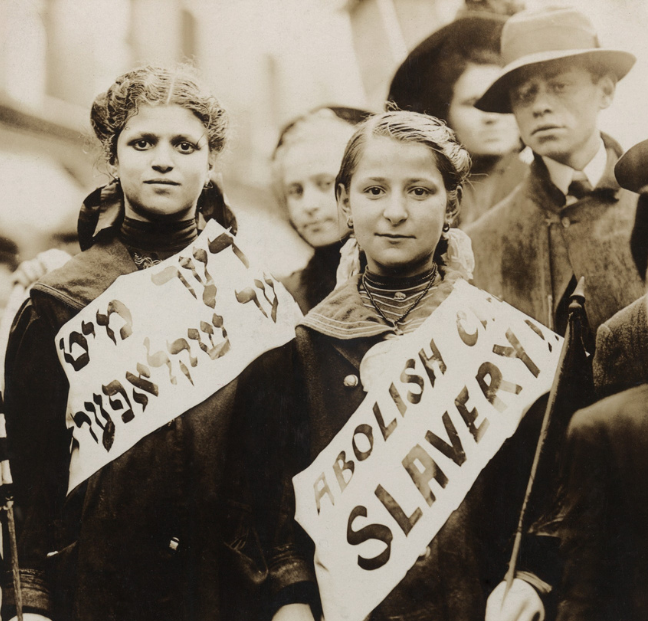A D’var Torah for Parshat Mishpatim by Allen Lipson
As workers across the country lead backs-to-the-wall organizing drives in the long odds of a COVID economy, Parshat Mishpatim’s labor laws offer a timely opportunity to reclaim the legacy of Rav Avraham Bick’s Mishnas Ha’Poel (The Teaching of the Worker), an all-but-forgotten tale of Jewish class solidarity that might have been.
Rav Bick, a Polish-born Orthodox student of Rav Kook, immigrated to America and founded a flourishing progressive yeshiva on the Lower East Side, the Institute for Jewish Studies, which at its prime in 1947 boasted 400 students and courses such as “The Jewish People Under Capitalism, Imperialism, and Socialism.” The House Un-American Activities Committee soon stopped the project in its tracks, summoning Bick to plead the Fifth for a barrage of trumped-up charges — including teaching at the Civil Rights Congress, a left-wing legal advocacy group for unjustly accused southern Blacks, and serving on the board of a Workmen’s Circle summer camp. Bick found no champions among his day’s Jewish establishment; his accusers included a local liberal rabbi, and prosecutors submitted as evidence a disingenuous letter from the Jewish Statistics Bureau, the official record-keeping body of American denominations, forcefully declaring that Bick had never been ordained in the country — unsurprisingly, since he had been ordained in Israel. In the trial’s aftermath, the yeshiva rapidly emptied, its students scared away by well-grounded worries over red-baiting. (To my knowledge, the sole written account of Bick’s life is that of Hayyim Rothman, whose research I draw on here.)
Sign up to receive Moral Torah in your inbox each week.
Rav Bick’s life’s work, Mishnas Ha’Poel, an untranslated collection of labor law responsa for the modern era, aims to define the category of legally protected work. So many of today’s labor battles hinge on that definition: to name a few, ride-sharing apps’ dubious claims that their drivers are “contractors” rather than employees; widespread employer practices of keeping weekly worker hours just below health care benefit thresholds; and graduate students’ unsuccessful struggles to gain federal standing to unionize.
The classic halakhic source for these issues is Parshat Mishpatim’s laws of Israelite workers, including the eved ivri (Hebrew slave), who receives a sort of “retirement package” upon the completion of his six years of service (Ex. 21:2, Deut. 15:13); and the sakhir (hired worker), which the Mishnah and Gemara understand as an hourly employee (Ex. 22:14, Bava Metzia 83a). At the center of either relationship, Rav Bick claims, is the raw fact of inequality, which halakha explicitly confronts: “The Torah gives the worker a distinct right to sustenance, such that he is in bondage to his employer only in matters like production and work hours; but the employer has no mastery or ownership whatsoever over his worker’s body.”
Find more commentaries on Parshat Mishpatim.
Relying on Talmudic sage Rav’s interpretation of Leviticus 25:42 — “To [God] alone [the Israelites] are servants, and not servants to servants” (Bava Metzia 10a) — Rav Bick argues that workers’ rights derive not from any contract or political arrangement but from their relationship with God. Employers have no inherent claim to authority beyond that of social custom. In other words, workers have only one real boss — HaKadosh Barukh Hu. From this principle, Rav Bick marshals an array of halakhic sources to argue that a group of workers can withhold their labor at any time, even at significant financial loss to their employer (see Shulchan Arukh CM 333:3, Mayim Chayim CM 327, Malkhei B’Kodesh 3:5). Written in 1947, the year that a Republican-controlled Congress cracked down on workers’ right to organize and strike through legislation still on the books today, Mishnas Ha’Poel’s clarion call for worker justice rang urgent then as it does now.
Given the renewed urgency of Rav Bick’s central concerns — employers’ moral obligations, power dynamics within the labor market, theological grounds for worker solidarity — one might wonder why Mishnas Ha’Poel and other works like it rest untouched on their dusty shelves.  Part of the answer, I can’t help but suspect, is that Rav Bick evokes all that middle-class Ashkenazi Jews like me have left behind in order to “make it” in suburban America: radical class politics coupled with old-world religious piety to boot. But his work, and the progressive yeshiva he sought to build, gesture toward a tantalizing vision of a progressive Jewishness that might have been — and with our help, that might yet be.
Part of the answer, I can’t help but suspect, is that Rav Bick evokes all that middle-class Ashkenazi Jews like me have left behind in order to “make it” in suburban America: radical class politics coupled with old-world religious piety to boot. But his work, and the progressive yeshiva he sought to build, gesture toward a tantalizing vision of a progressive Jewishness that might have been — and with our help, that might yet be.
Allen Lipson is a rabbinical student at Hebrew College, a former labor and faith-based organizer, and a year alumnus of Yeshivat Hadar. Through his T’ruah fellowship in 2020, he worked at the organizing coalition Faith in New York. His writing has appeared in Review of Rabbinic Judaism.

